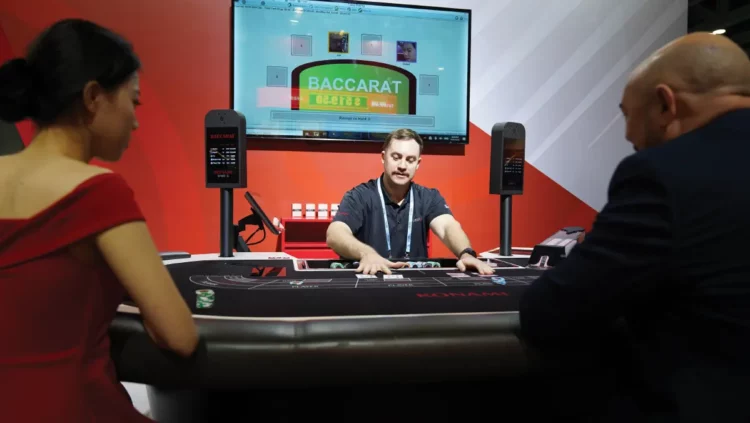Konami caught the eye at the recent G2E Asia show in Macau with its SYNK Vision Tables, which utilize facial recognition technology to fulfil the player tracking and harm minimization concerns of operators and regulators alike.
The pervasive nature of the current regulatory environment in Australia may be pushing operators to the limit, but it is also inspiring suppliers to develop solutions that can provide a meaningful way forward for the industry.
One of those is Konami, which is preparing to launch new facial recognition technology for gaming tables that promises to improve optimization for operators while addressing the harm minimization concerns of regulators.
First envisioned back in 2018 as a means of allowing anonymous bonusing, the new SYNK Vision Tables – powered by Konami’s casino management system SYNKROS – are seen as a transformative tool for casino floors across Australia as they navigate the specific needs of the local market.
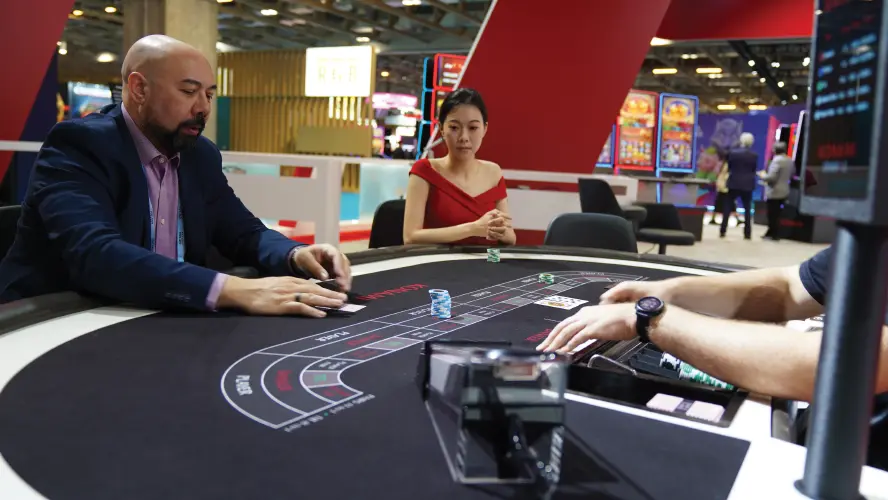 “This is certainly not smart -table technology and we’re not trying to play in that space – this is about easing the journey for the dealer and identifying the player securely,” explains Konami Australia’s Systems Sales & Operations Manager, Joe Mayer.
“This is certainly not smart -table technology and we’re not trying to play in that space – this is about easing the journey for the dealer and identifying the player securely,” explains Konami Australia’s Systems Sales & Operations Manager, Joe Mayer.
“We know from experience in Australian casinos, card sharing is a significant issue. It’s an issue for the casino, for the marketing promotional side and is also a concern for the regulator due to the lack of tracking the player. So, this gives you absolute security that you’re rating the correct player.
“Given the regulatory environment in Australia, the other thing that SYNK Vision does when you sit down at the table is start your time on betting. In jurisdictions like Queensland where they’re proposing a maximum of 28 hours a week of gambling (Editor’s Note: a 36-hour rule already applies in New South Wales and Victorian casinos), we can start that counter accurately as soon as the player sits down, and then when they get up, it automatically closes that rating.
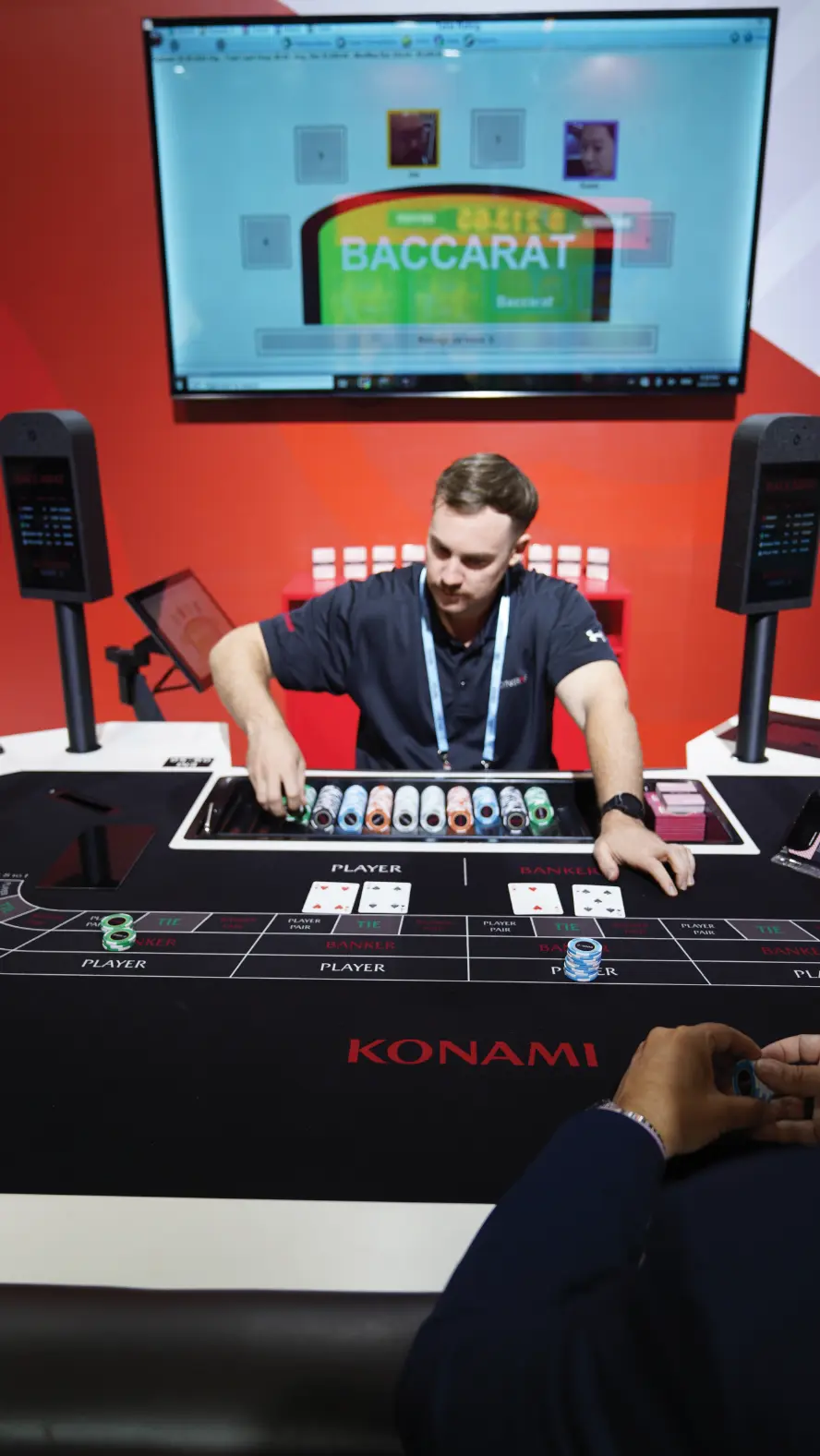 “Finally, we’ve engaged most of the regulatory bodies in Australia and are at various stages with different regulators around field trials for the harm minimization facial recognition journey – specifically around auto-enrol anonymous processes for limits and exclusions. Under the current Australian exclusion model you need to go to an agency, fill out a form, sign all the consent papers and they then send a photo to every public venue you’ve excluded from, but the problem is you are relying on their security team recognizing your face from a list of a thousand faces they’ve seen that day.
“Finally, we’ve engaged most of the regulatory bodies in Australia and are at various stages with different regulators around field trials for the harm minimization facial recognition journey – specifically around auto-enrol anonymous processes for limits and exclusions. Under the current Australian exclusion model you need to go to an agency, fill out a form, sign all the consent papers and they then send a photo to every public venue you’ve excluded from, but the problem is you are relying on their security team recognizing your face from a list of a thousand faces they’ve seen that day.
“We are now offering a process where the player can sit down at home, download the app, go through the consent processes, enter their details and self-enrol with their mobile phone camera. That will then automatically lock them out of every machine in the areas they’re selecting for exclusions. We can absolutely eliminate exclusion leakage.”
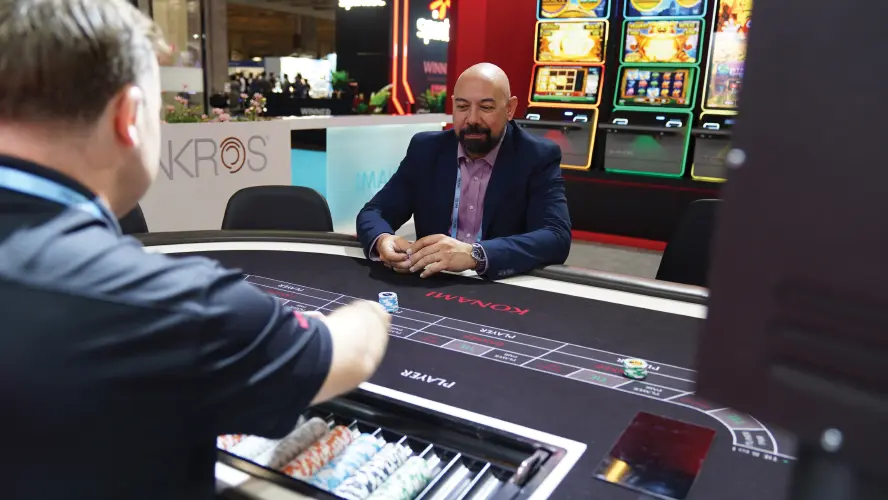 From the player’s perspective, SYNK Vision Tables offer an unobtrusive means of facial recognition: the technology immediately recognizes member individuals who are already logged into the system, while new players are auto-enrolled as a guest account and a rating opened for them.
From the player’s perspective, SYNK Vision Tables offer an unobtrusive means of facial recognition: the technology immediately recognizes member individuals who are already logged into the system, while new players are auto-enrolled as a guest account and a rating opened for them.
This is similar to the technology in Konami’s previously released SYNK Vision Slots which, through real-time biometric authentication, allows players to log in, earn rewards and receive personalized promotions simply by sitting down at a machine. It also eliminates the need for physical loyalty cards.
Importantly, notes Mayer, the technology provides different benefits for different regions. While Australian operators will no doubt view it as a regulatory play, clients across Asia have shown interest in the ability of SYNK Vision Tables to provide precise ratings data that can significantly improve the volume and accuracy of player reinvestment rates.
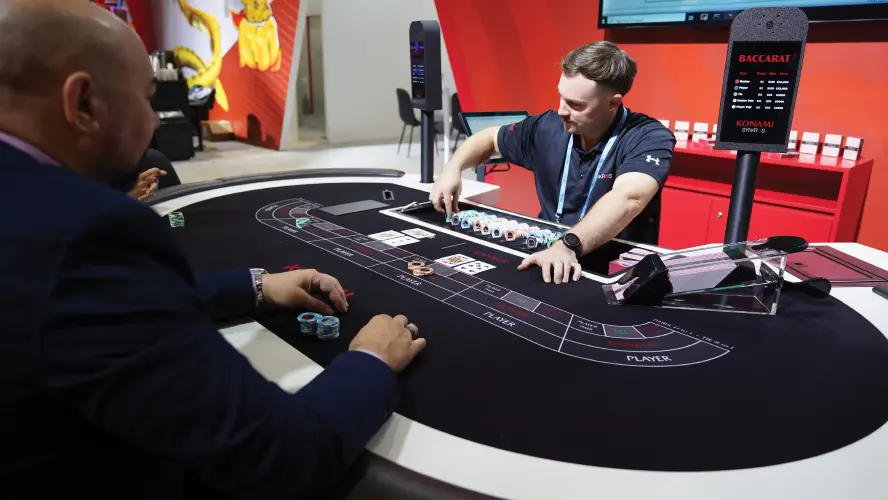 “The Asian-based customers who are coming to talk to us are really excited about anonymous bonusing and the capabilities to reward players without having to identify them,” Mayer explains.
“The Asian-based customers who are coming to talk to us are really excited about anonymous bonusing and the capabilities to reward players without having to identify them,” Mayer explains.
“That’s also our focus in North America, because even if you have great carded play rates you’re still missing 20% to 30% of your rated play. There are some analytics products out there that work fantastically well on identified carded play, but there is still a big gap in uncarded data and not being able to tie it to players. Our technology drives promotions, drives marketing, drives data analytics and really fills a lot of gaps for casino operators.”
Timing, as they say, is everything, and so it has been for Konami too. The company’s first attempt at developing a facial recognition system back in 2018 was put on hold when it became clear that cost of implementation was prohibitive. Fast forward three years to the midst of COVID – also around the time that the first of Australia’s regulatory inquiries into casino operators Crown and Star were getting underway – and a new opportunity was emerging.
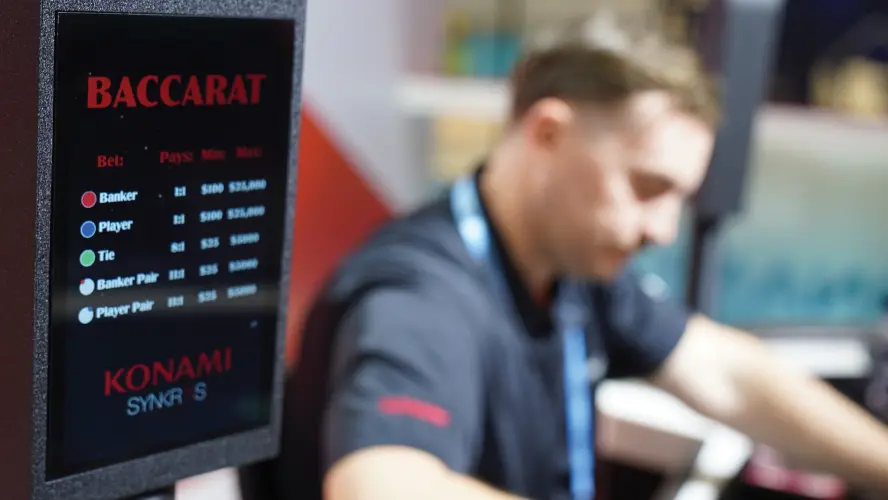 “[Computing giant] Intel came back to us and said the industry had just developed something called Vision AI which meant we could do edge recognition on AI microchips, embedded in a camera at a significantly lower cost,” Mayer explains.
“[Computing giant] Intel came back to us and said the industry had just developed something called Vision AI which meant we could do edge recognition on AI microchips, embedded in a camera at a significantly lower cost,” Mayer explains.
“So, we partnered with a Sydney-based startup in the Vision AI space called Xailient, and as a result we now have a camera that offers an extremely low-cost solution but also a low- infrastructure solution.”
Described by Mayer as being “production ready”, Konami’s SYNK Vision is now undergoing field trials in Singapore and shortly in a handful of Australian clubs with a view to full availability later this year.
And it seems like the industry is ready too.

“When we first showed this three years ago at G2E in Las Vegas, a lot of people would say, ‘I don’t want this on my casino floor – our customers aren’t going to like it’. Now people come just to see us, because attitudes have changed.
“Obviously we consider ourselves privacy safe because we don’t capture images and we don’t store video, however in general the proliferation of facial recognition everywhere in the world has made people far more comfortable with it.
“I mean, Apple has done us a great favor with the iPhone, where everyone is comfortable using facial recognition to unlock, and now Microsoft uses it on their Windows tablets and PCs. We’re witnessing a changing mindset globally.”






